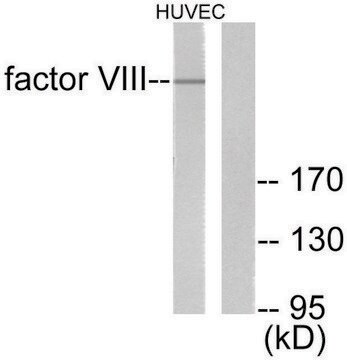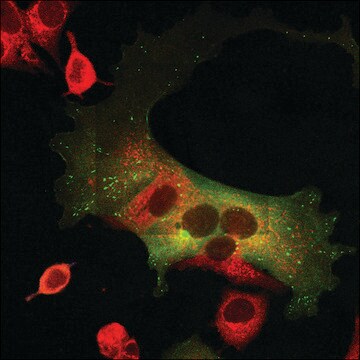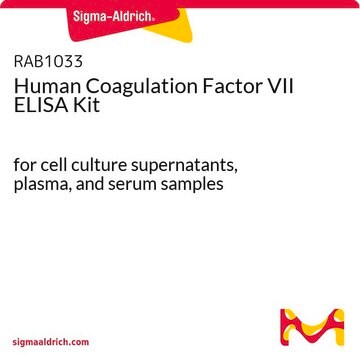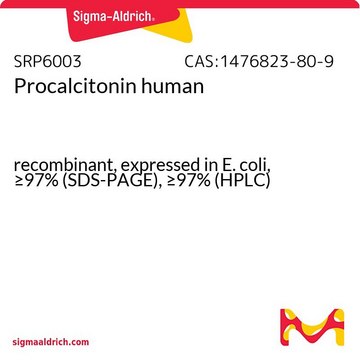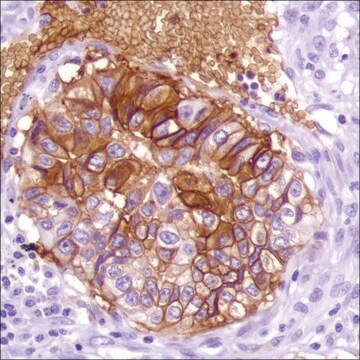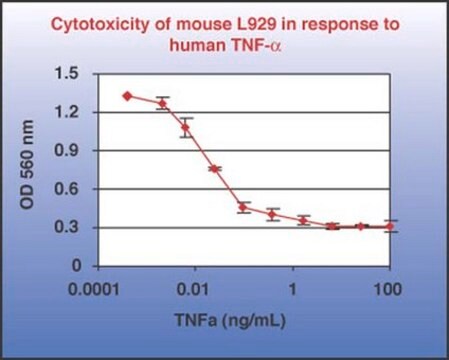F8146
Anti-Factor VII antibody, Mouse monoclonal
clone HVII-1, purified from hybridoma cell culture
Autenticatiper visualizzare i prezzi riservati alla tua organizzazione & contrattuali
About This Item
Prodotti consigliati
Origine biologica
mouse
Livello qualitativo
Coniugato
unconjugated
Forma dell’anticorpo
purified immunoglobulin
Tipo di anticorpo
primary antibodies
Clone
HVII-1, monoclonal
Stato
buffered aqueous solution
Reattività contro le specie
human
tecniche
indirect ELISA: suitable
western blot: 1:4,000
Isotipo
IgG1
N° accesso UniProt
Condizioni di spedizione
dry ice
Temperatura di conservazione
−20°C
modifica post-traduzionali bersaglio
unmodified
Informazioni sul gene
human ... F7(2155)
Categorie correlate
Descrizione generale
Anti-Factor VII antibody, mouse monoclonal (mouse) IgG1 isotype) is derived from the HVII-1 hybridoma produced by the fusion of mouse Sp2/0-Ag14 myeloma cells and splenocytes from immunized BAB/c mice. Human coagulation factor VII contains 10 gamma-carboxyglutamic acid residues (Gla), located at the N-terminal region of the molecule. The activated factor VII (factor VIIa) also consists of a light chain with the Gla-domain and an epidermal growth factor domain, which is linked by a disulfide bond to a heavy chain, containing the serine protease catalytic domain.
Specificità
The antibody recognizes an epitope on the light chain of Factor VII in the presence or absence of divalent cations. Clone no. HVII-1 (also cited as clone no. MC1476/E.A.8.1) may be used for purification of Factor VII and for the preparation of Factor VII depleted human plasma.
Immunogeno
Factor VII from pooled normal human plasma.
Applicazioni
Anti-Factor VII antibody, Mouse monoclonal has been used in:
- the preparation of factor VII - depleted plasma and for purification
- sandwich-type immunoassays
- the evaluation of patients with hereditary factor VII deficiency by an enzyme linked immunosorbent assay (ELISA) or radio immunosorbent assay (RIA)
- the assay of factor VII level in patients with liver disease (a sensitive parameter of liver dysfunction)
- epidemiological studies of the importance of factor VII level as a risk factor for coronary heart disease, cerebrovascular disease and peripheral vascular diseases
- the determination of the activity state of factor VII in in vivo samples when used with a clotting assay
- flow cytometry
Applications in which this antibody has been used successfully, and the associated peer-reviewed papers, are given below.
Flow cytometry/Cell sorting (1 paper)
Flow cytometry/Cell sorting (1 paper)
Monoclonal Anti-Factor VII antibody is suitable for flow cytometry analysis to study the behavior of TF-fVIIa secreted by ovarian cancer cells was associated with microparticles (MPs). It is also suitable for western blot at a dilution of 1:4,000 and indirect ELISA.
Azioni biochim/fisiol
Factor VII is a single-chain vitamin K-dependent glycoprotein in human coagulation. It has a molecular weight of ∼50,000Da, present in plasma in trace quantities. It is predominantly synthesized in liver and depends on the posttranslational γ−carboxylation of specific glutamic residues located near the NH2-terminus of the molecule. It is a serine protease zymogen and for activation it requires proteolytic cleavage in the disulfide-linked, two-chain form, Factor VIIa, by Factor Xa, Factor IXa, thrombin and Factor XIIa or β XIIa.
Stato fisico
Solution in 10 mM HEPES buffer, pH 7.4, with 140 mM sodium chloride and 0.05% sodium azide.
Esclusione di responsabilità
Unless otherwise stated in our catalog or other company documentation accompanying the product(s), our products are intended for research use only and are not to be used for any other purpose, which includes but is not limited to, unauthorized commercial uses, in vitro diagnostic uses, ex vivo or in vivo therapeutic uses or any type of consumption or application to humans or animals.
Non trovi il prodotto giusto?
Prova il nostro Motore di ricerca dei prodotti.
Codice della classe di stoccaggio
10 - Combustible liquids
Classe di pericolosità dell'acqua (WGK)
nwg
Punto d’infiammabilità (°F)
Not applicable
Punto d’infiammabilità (°C)
Not applicable
Scegli una delle versioni più recenti:
Possiedi già questo prodotto?
I documenti relativi ai prodotti acquistati recentemente sono disponibili nell’Archivio dei documenti.
G J Broze et al.
The Journal of biological chemistry, 255(4), 1242-1247 (1980-02-25)
Blood coagulation Factor VII was purified 100,000-fold from fresh frozen human plasma to apparent homogeneity with a yield of 30% based on coagulation assay. The molecular weight estimated by sodium dodecyl sulfate-polyacrylamide gel electrophoresis was 48,000. Factor VII is composed
Regulated readthrough: A new method for the alternative tagging and targeting of recombinant proteins
Bouquin T, et al.
Journal of Biotechnology, 125(4), 516-528 (2006)
Thomas Bouquin et al.
Journal of biotechnology, 125(4), 516-528 (2006-05-10)
We report here a new method for the alternative peptide tagging of recombinant proteins from mammalian cell lines. This method, which we called regulated readthrough, exploits the property of aminoglycoside antibiotics to promote translational readthrough of nonsense codons. The basic
Structural biology of factor VIIa/tissue factor initiated coagulation
Vadivel K and Bajaj SP
Frontiers in Bioscience, 17, 2476-2476 (2012)
H Philippou et al.
Blood, 89(3), 767-775 (1997-02-01)
We report the development of an enzyme-linked immunosorbent assay (ELISA) that is specific for factor VIIa (FVIIa). This assay uses a neoantigen specific capture antibody directed to the amino acid peptide sequence N terminal to the FVII cleavage activation site.
Il team dei nostri ricercatori vanta grande esperienza in tutte le aree della ricerca quali Life Science, scienza dei materiali, sintesi chimica, cromatografia, discipline analitiche, ecc..
Contatta l'Assistenza Tecnica.